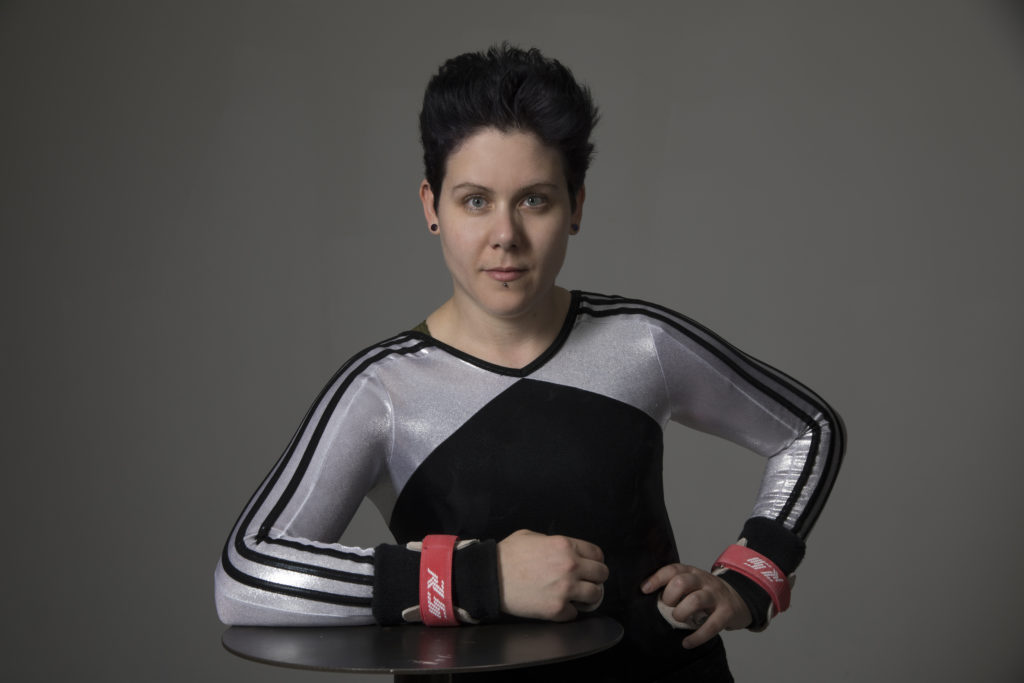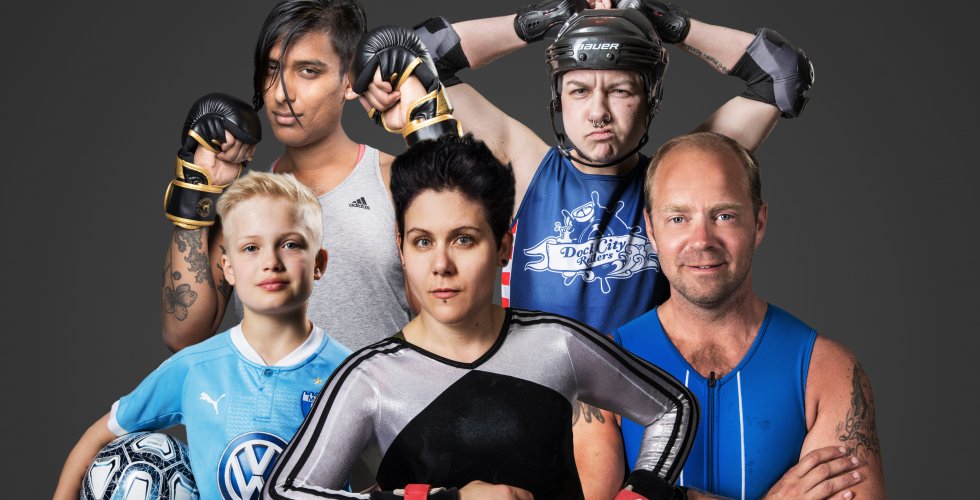
Heroes that inspire
Role models are a source of motivation and self-confidence, they help you understand your true potential. Many gender divided sports effectively exclude athletes with a trans experience. In spite of that there are people who find their inspiration, their joy and commitment in sports. They are ahead of their time and inspire us. Author Aleksa Lundberg and photographer Elisabeth Ohlson Wallin have met with five heroes that will change our current time, our future and our relationship to sports.
Julle, the player who touched a whole country
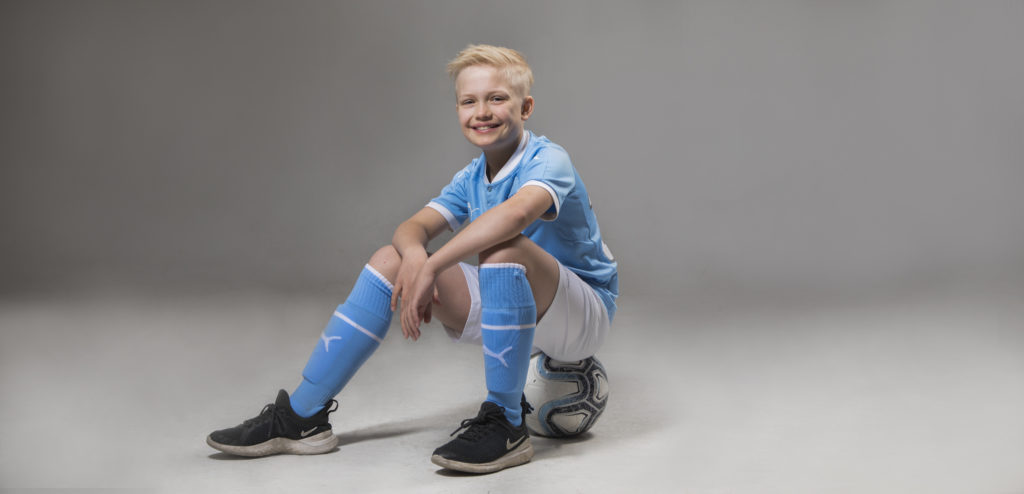
Name: Julle
Age: 10 years old
Lives: Veberöd, east of Lund
Plays: Football in Lund FF
Started doing sports: When he was 4
Role models: Gabriel Fontana, Zlatan, Ronaldo and Leon Reuterström
There’s a surge of euphoria running through football player Julle (10) when he gets to run on the field, pass the ball and be part of a team. He was excluded from the boy’s team because of his trans status when he was eight, which led to alienation even at school. Now the club has apologised and welcomes him back.
Julle became known to the Swedish public after his appearance on Kalla Fakta and the feature about the soccer organisation that excluded him from the boys’ team. The board of the organisation felt that “girls should play with girls and boys with boys” and didn’t believe that Julle was a boy, even though he identifies as a boy.
His friends took after the adult’s and started bullying Julle at school for “being a girl” and “not a real boy”. The situation became intolerable and Julle’s mom, Petra Douhane, arranged for Julle to change schools.
— Before the exclusion from the team there were no problems between Julle and his friends. It all started when the grown-ups made this division between boys and girls. Children don’t think it’s odd that Julle plays on the boys’ team. It’s all down to norms created by society, by adults; it becomes like”the norm keepers’ association”. Everything is so much easier when you can label people, says Petra Douhane.
After Kalla Fakta’s feature a parent from the club Lund FF reached out to Petra and wondered if Julle wanted to play on their boys’ team instead. And that he wanted.
— It felt safe right away. Everybody was super welcoming, says Julle.
How were you treated by your new friends?
— It was just fun, I was treated like everybody else.
Even though it was difficult to get from the home in Veberöd to football practice in Lund, with early mornings and late nights as a consequence, Julle never for a moment hesitated.
“As soon as I get to run with the ball I die laughing”
— As soon as I get to run with the ball I die laughing, for some peculiar reason, he says with a smile from ear to ear.
— It’s really like that, a surge of happiness, says mother Petra.
To play a game is something Julle especially enjoys, and it’s not unusual that he beats his competition.
— It may be a bit sad for those who lose, but for me it’s fun. I get happy and feel proud of myself, that I’ve fought.
He especially remembers the feeling when he made his first goal.
— We played against a difficult team and the field was really small. My teammates passed me the ball and I aimed at the goal, but missed. The goalkeeper took the ball in his hands and was about to kick it away, but I got to it and kicked it into the goal.
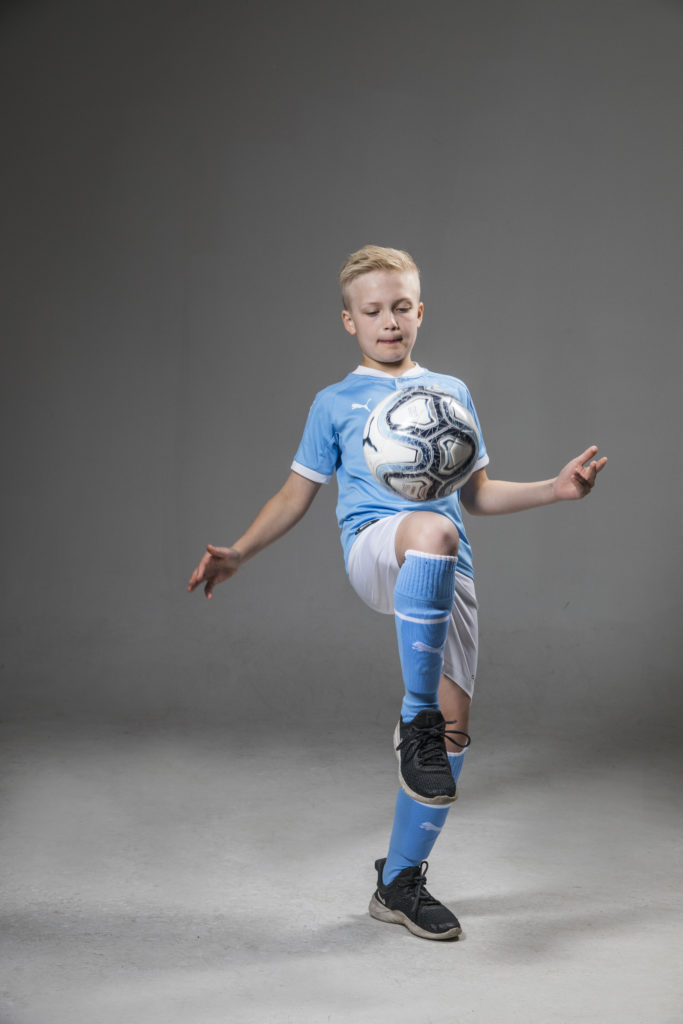
If you as a trans person don’t feel safe doing sports, or don’t dare, how can you go about it?
— Just go for it! It’s like when you’re new at the gym. I watched a movie where someone felt like “now everybody is looking at me, I’m new here”. Just do it, don’t care about what someone else thinks.
Julle thinks he’s gotten his courage from his mom. If he’s too shy to ask someone for an autograph for example, mom Petra does it instead, he explains. She’s one of Julle’s role models. Apart from her — and Zlatan of course — Julle also looks up to artist Gabriel Fontana.
— He spreads joy with both long and short hair. And high heels. He doesn’t care what anyone else thinks. When he was on Talang he didn’t want to win, only to spread love. Show that he dares to be himself. That I think is nice.
So he’s also trans?
— No, I think he’s just a ze. He just goes for it. If he like finds glitter, he wears it. Then he’s happy. And he likes short shorts, that’s something I’ve noticed.
One thing that would’ve made it easier for Julle to practice his sport is if the clubs had allowed mixed teams. He thinks that there shouldn’t be too much focus on gender or gender identity, he just wants to play and have fun.
— The kids can manage by themselves, the grown-ups don’t have to decide so much.
Julle’s previous club has apologised for its actions, after having signed a conciliation agreement with Petra Douhane and the organisation Malmö against discrimination. At the same time they welcome him back on the team. A person with experience in LGBTQ issues has also been employed, in order to raise the level of knowledge.
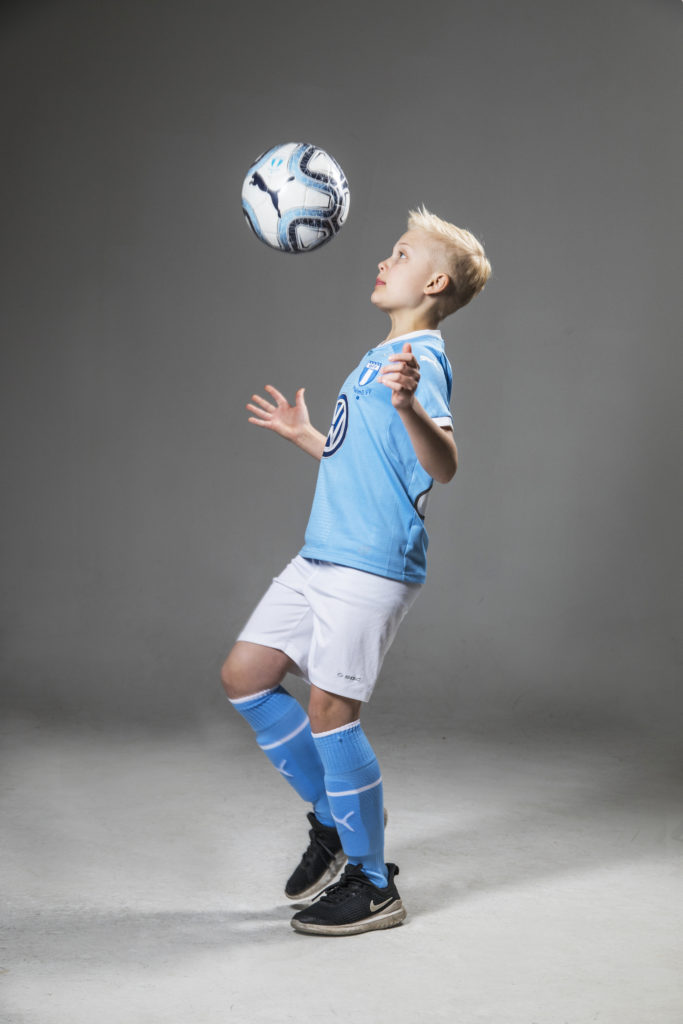
When we talk about the possibility of coming back to the team there’s hesitation in Julle and Petra, but only after a couple of weeks Petra Douhane calls and says that Julle now has joined his home team again.
— A lot has happened. It was evident at the first practice that those who had been unkind had a completely different attitude now. They were very good at acknowledging and supporting him. Now he’s part of the team and he loves it. And he doesn’t have to travel for one hour to get to practice, says a nervous but happy mom Petra.
He has also chosen to start school in his home municipality again.
— It’s different there now, with new teachers and a new headmaster that takes Julle’s situation seriously. They want vindication. They have made a clear plan and seen to it that he gets his own locker room at gym class. And he will be with his football friends, who have apologised.
Petra says that she’s been stopped in the street by people who think it’s good that Julle is back on his own turf again.
“He just wants to play football.”
— I’ve been very nervous, but this is so good. He just wants to play football. I hope things go well in the club and that they keep up the work.
Around Julle’s neck hangs a key with an ornate pattern at the handle. He wears it to remember that it’s possible to open closed doors.
— It means that if you’re in a tough spot, it opens all doors. You just take your key and unlock them, he says.
See Julle in Kalla fakta; Utanför laget
Devine, a fighter from Eskilstuna
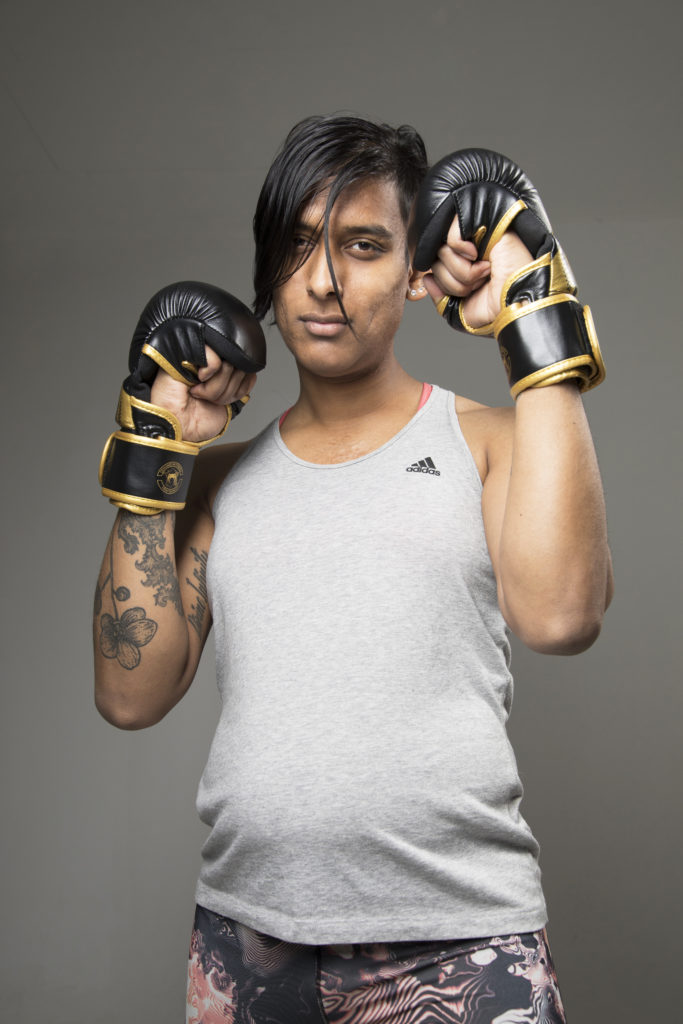
Name: Devine Österman
Age: 27 years
Lives: Eskilstuna
Sport: MMA and thai boxing
Started doing sports: Eleven years ago
Role model: My wife. It’s not enough to say she has a heart of gold, she has supported me like nobody else has
Devine Österman (27) from Eskilstuna has a fighter within. Since she was little she has battled social phobia and the status as a trans girl has contributed to her feelings of insecurity. But thanks to MMA and thai boxing she has found a safe haven.
— It’s a fun way of exercising and also good for the emotional life, she says.
When Devine Österman was younger, martial arts was out of the question. Her parents believed it was madness to “pay to fight”, so she did track and field, mainly 200 meters and 400 meters sprint. Six months ago Devine started doing thai boxing and about a month ago she started practising the controversial martial art MMA (Mixed Martial Arts).
— In a way it’s about fighting, but then I think that there are more accidents in football and ice hockey. It’s more dangerous to ride a car than doing martial arts. I can understand those who mean that we “just fight”, but we’re doing it in a very controlled way, says Devine.
It’s not only the exercise that means a lot, but also the friends in the thai boxing club that have become a second family.
“All of a sudden you got a bunch of friends.”
— I’ve been so well received in this club. All of a sudden you got a bunch of friends.
Most of the time Devine has fun at practice, but sometimes the difficult emotions take over and then it’s important not to give up.
— I’m not a person who gets things for free, but likes to be active and fight for the reward. When I get home I feel so relaxed. Especially when I’ve given it my all.
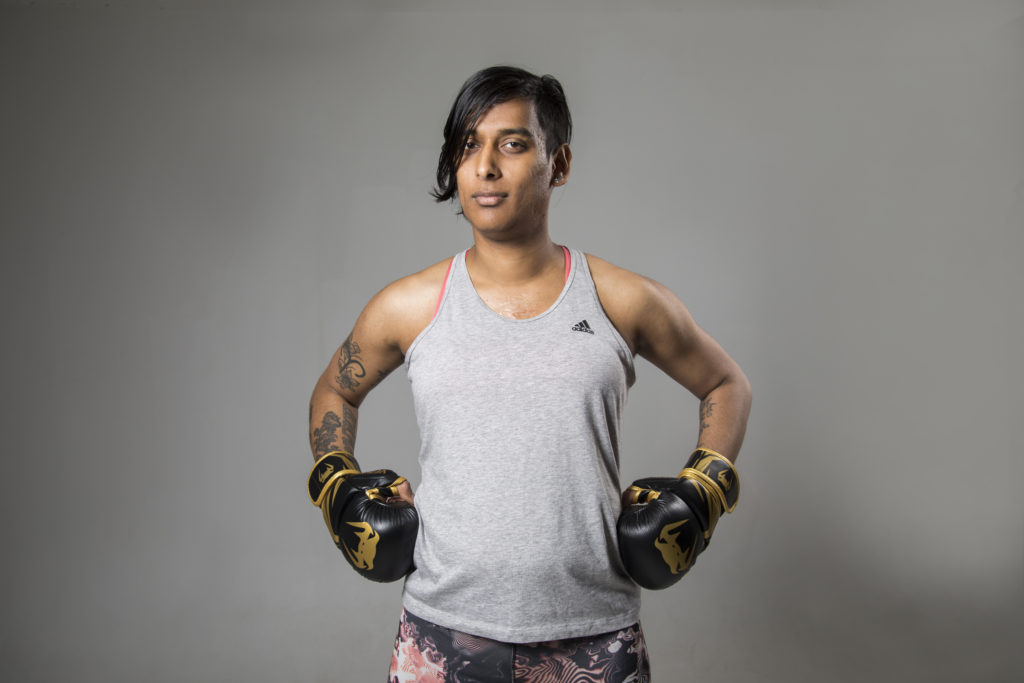
Since Devine is new to the world of martial arts she hasn’t gotten any experience in winning from it, but she does know what it feels like to win from her days doing track and field. Basically she’s very competitive, who sees winning as proof of that the effort has been worth it.
— It’s both good and bad to like to win, because I can be somewhat of a sore loser. Back then, before I knew I had another identity, I was competing under completely different circumstances.
How do you mean?
— Before I felt obligated to compete and train to get better, to feel valuable. It was more of a must, not just because it was fun. Today it’s almost only fun. But of course I want good results, like most people.
Does your “new” attitude have to do with coming out?
— Both yes and no. It has of course contributed, but I have worked on myself and my emotional life in therapy for a long time. This journey will never end, I mean, you can grind a stone forever. There’s a big difference between how I was then and how I am now. If training goes bad I no longer think I’m a bad person.
What would you like to say to other trans people who don’t dare do sports?
— That you should do it at your own pace and not demand too much of yourself. I wish I had a lot of courage, but you have to realise that it isn’t so easy all the time. Like feminism for example, there’s a lot of talk about “having strong female role models”, but it needs to be ok to not be strong. Because that’s a demand in itself. It has to be ok to choose the easier path. Do what works for you.
One concrete advice from Devine to someone who has mixed emotions about doing sports is to find out what the law says, to know what rights you have. Another tip is to start training with a friend or go someplace where you already know people.
“You don’t need to make great achievements, take the easy route.”
— For me that was what made it easier; that I have someone I trust and knows my history in the organisation. I’ve suffered from social phobia and that has made it hard for me to start doing sports. Again, you don’t have to make huge achievements, take the easy route.
Devine hasn’t come across any bigger hurdles in martial arts yet. As a new member of the organisation she mostly has positive experiences, apart from isolated cases when someone has mis-gendered her unknowingly. But there is a certain worry about upcoming competitions.
— I’m applying for dispensation so that I can compete in the women’s competition and have been told that it shouldn’t be a problem. The social aspect can be problematic. That some people think it’s unfair and wonder what I’m doing there.
Are you worried about negative attitudes?
— Yes. I’m afraid that it’s going to be too much for me mentally. That it will take the joy out of it. And, sure, sometimes I’m scared that someone will come after me physically.
The worry makes it easy to lose focus and get tense, Devine explains. But she comes back to that most people wish her well and that the fear isn’t only related to her trans status.
— All my life I have thought that people are mean until proven otherwise. In therapy, I have learned that people can be good too. I try not to worry too much, a negative attitude can lead to me not grabbing hold of the possibilities in life.
There’s a collision in my mind when I hear that a trans feminine person does martial arts. How do you perceive the gap between prejudice about “real men that fight” and the reality where you as trans feminine practice MMA and thai boxing?
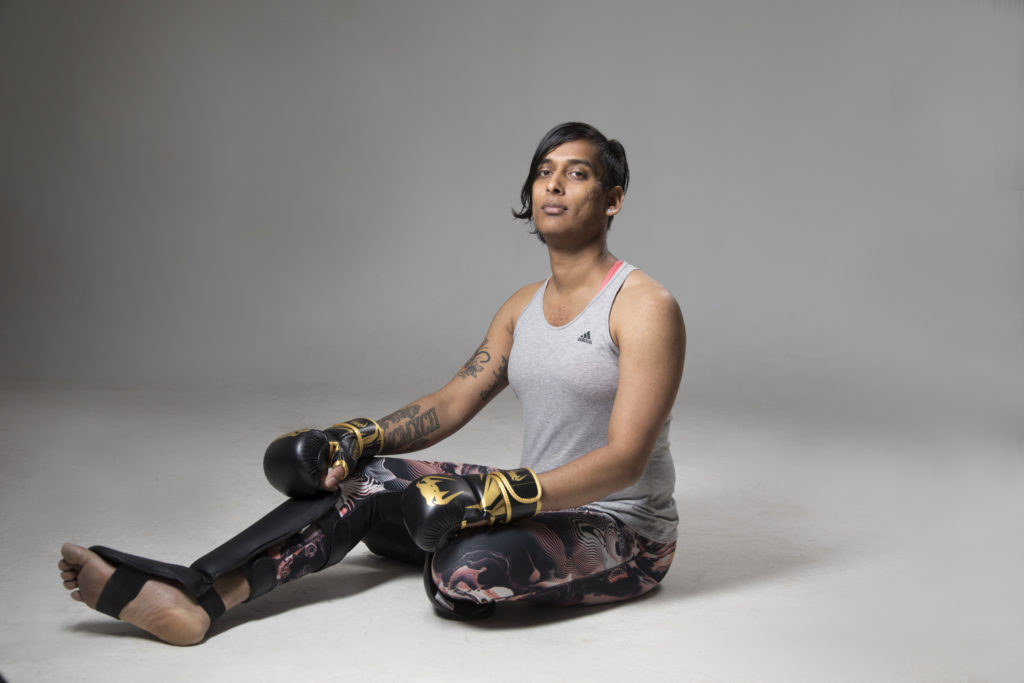
— I can understand that. Many probably think that “girls don’t fight”, says Devine and laughs. It’s ok for men to be extrovert, but as a girl you’re expected to be calm. It’s probably more common that boys fight under unregulated circumstances, but in the world of sports I don’t think anyone cares if you’re a boy or a girl.
In Devine’s club boys and girls are mixed during practice. Who you fight depends on experience, weight and height rather than gender. A girl can knock out a guy, says Devine.
— If you’re equally experienced and are the same weight; go for it, she says.
Have you battled with the image of “the man that fights” and your identity as a woman at any point?
— I have, it’s just difficult to explain how, says Devine and seems pensative.
— I don’t know what’s in line with the research, but sometimes I grapple with being born in a man’s body. If someone thinks that it doesn’t matter that I take hormones because “I still have my broad shoulders” for example, I wonder if I “should hold back or if a girl can be this strong”. It makes me a bit confused. If I give it my all I might ruin the the image of me being a girl, but at the same time I want to reach my full capacity. It’s most fun when I do my best.
In conclusion Devine wants to promote that we as a society should revise the normative image of men’s and women’s bodies. That we should start to accept different constitutions and not blindly presume that “girls have a vagina” or that “boys have penises”.
— A body is a body, she concludes.
Lukas, the triathlete who does ironman for fun
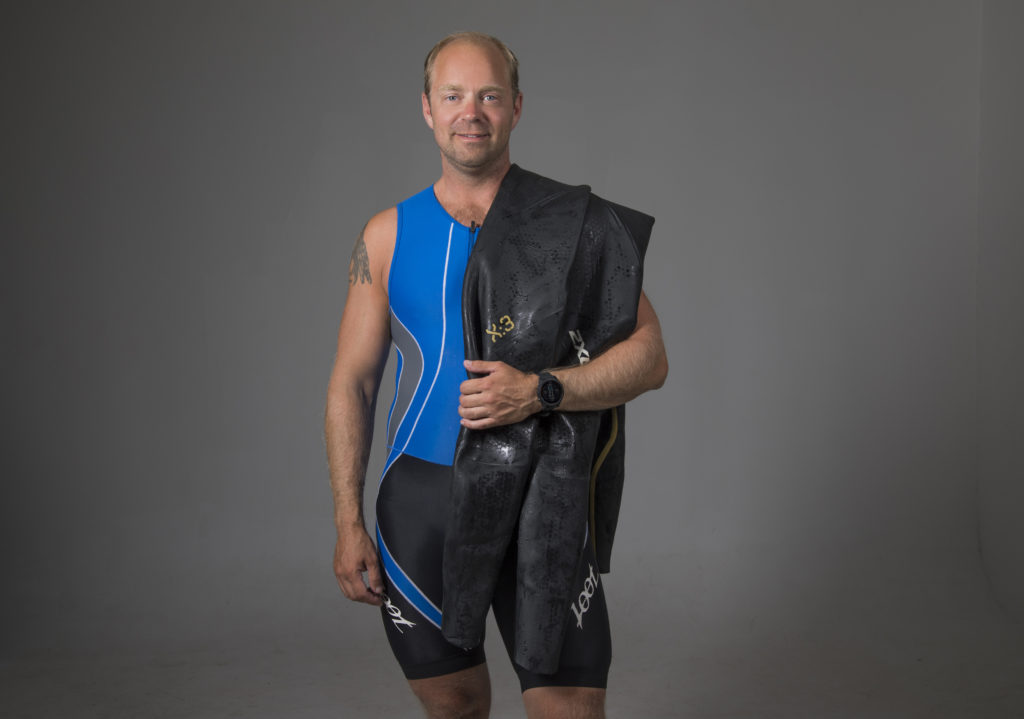
Name: Lukas Svärd
Age: 38 years
Lives: In Täby
Sport: Triathlon
Started doing sports: At the age of seven (first football, later ice hockey, rugby and handball)
Role model: I’ve had many, but they have fallen from grace one by one. Those macho men didn’t turn out to be so likable. My wife is my role model, Karin Svärd
Triathlete Lukas Svärd (38) loves the feeling of having given it his all and feels his best when training is tough. After gender affirming care, seventeen years ago, he felt it was necessary to seem macho, but as the years have passed he has embraced his more feminine sides.
— It took ten years before I understood who I was and started to accept the whole me, he says.
Lukas Svärd saw himself as a boy already at four years old. His biggest wish was to meet a genie that gave him three wishes. He wanted to be a boy named Johan, be together with his secret crush Malin and go from being poor to being rich.
Luka’s family lived under difficult financial circumstances, which meant that he had to wear his sister’s clothes when she outgrew them, something he really didn’t like.
When he started secondary school his mental health deteriorated. He often ran away from home and had suicidal thoughts.
— My self confidence was so low. People had tried to make me into a girl, and because of that I wasn’t accepted for who I was.
After secondary school Lukas started working instead of going to high school. He sold cookies and was often alone traveling. That way he got away from the pressure from everyone around him, but his mental health didn’t improve. One day he found himself by Motala river in Norrköping ready to jump.
— The police stopped me and took me to the psychiatric unit. I got a psychologist and for the first time I dared tell someone that I wanted gender affirming treatment.
In the beginning of his transition Lukas strived to fit in to the stereotypic image of a male. He became a commander and studied to become a fire fighter and started training for Ironman, an organisation that organises triathlons with the same name. One of his friends at the fire fighting training had taunted his classmates and said that “you’re never going to make it”, which triggered Lukas to prove himself.
All competitions around the world include four kilometers of swimming, eighteen miles of bicycling and finally a marathon (4,2 miles). The competitions are qualifying heats before the grand finale Ironman World Championship held in Kailua-Kona on Hawaii every year.
— I think it was a part of my journey to show everybody how manly I was, at the same time as I’ve always liked adventures. I think I pushed myself too hard. I got up at four in the morning, ran three miles and then worked for ten hours before training again. I was in a routine that wasn’t ideal because I so wanted to reach my goals.
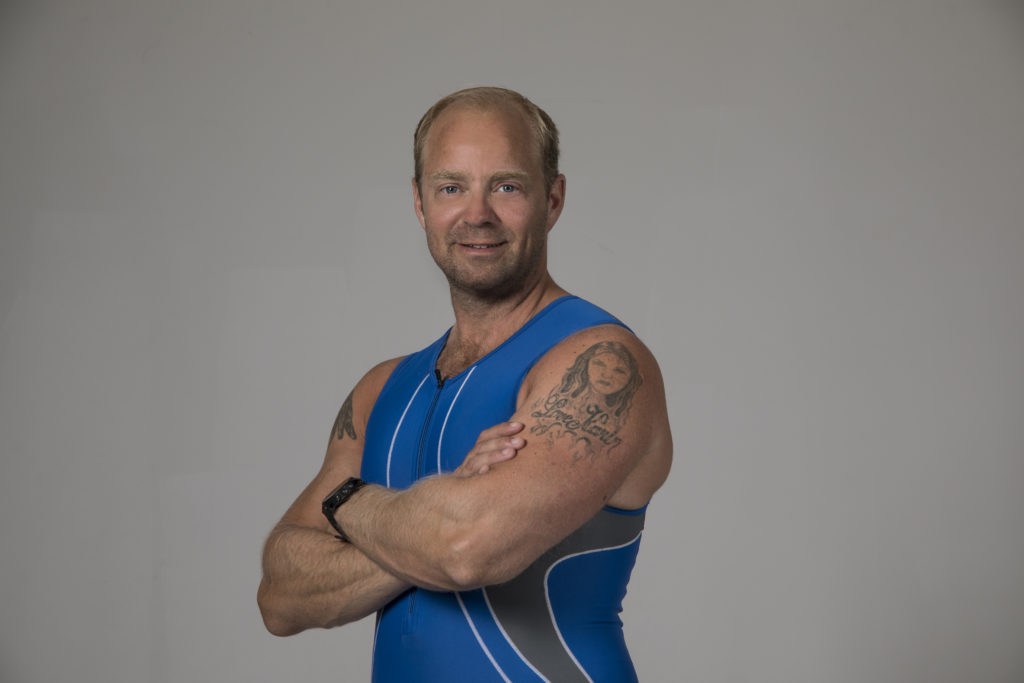
It took about ten years before Lukas really started to understand who he was and also accept the parts of him that he thought of as “feminine”. Today, he doesn’t want to prove his manliness or that he’s worthy as a triathlete. But he still likes the feeling of going for it and beating his personal best, which currently is nine hours and fifty two minutes. The record time for the competition is about eight hours.
Today Lukas describes Ironman as something “fun” that starts at seven in the morning and ends around midnight, when the last contestant crosses the finish line. All contestants join the audience when they’re done and wait for the last runner and cheer them on.
“There’s an amazing sense of community at these events.”
— There’s an amazing sense of community at these events, people call your name and cheer you on. It’s a wonderful feeling.
Before his first triathlon race 2014, Lukas had to go to an indoor swimmingpool to train swimming. It was the first time he would have to change in the men’s locker room. He sat down on one of the benches, but didn’t dare take off his clothes for fear that someone would see the scars on his chest or notice that he had had genital surgery. He chose to go home that time, but came back a few days later and solved the problem by changing in the bathroom.
— Today I’m happy that I didn’t skip swimming just because I had to change. You can never let another person ruin your life, he says.
For a while Lukas had his trunks on when he was showering, to avoid curious looks. But when an elderly man told him off and said that it’s forbidden to wear swimwear in the shower he decided that he had to go all the way.
— At first I got angry and thought: “You don’t know what I’ve been through in order to dare to be here.” But after having thought about it I realised that he was right and took his comment as a challenge. Today I have the courage to be naked in the changing room and it’s gone well so far. People aren’t as interested in you as you might think, most of it is in your own head.
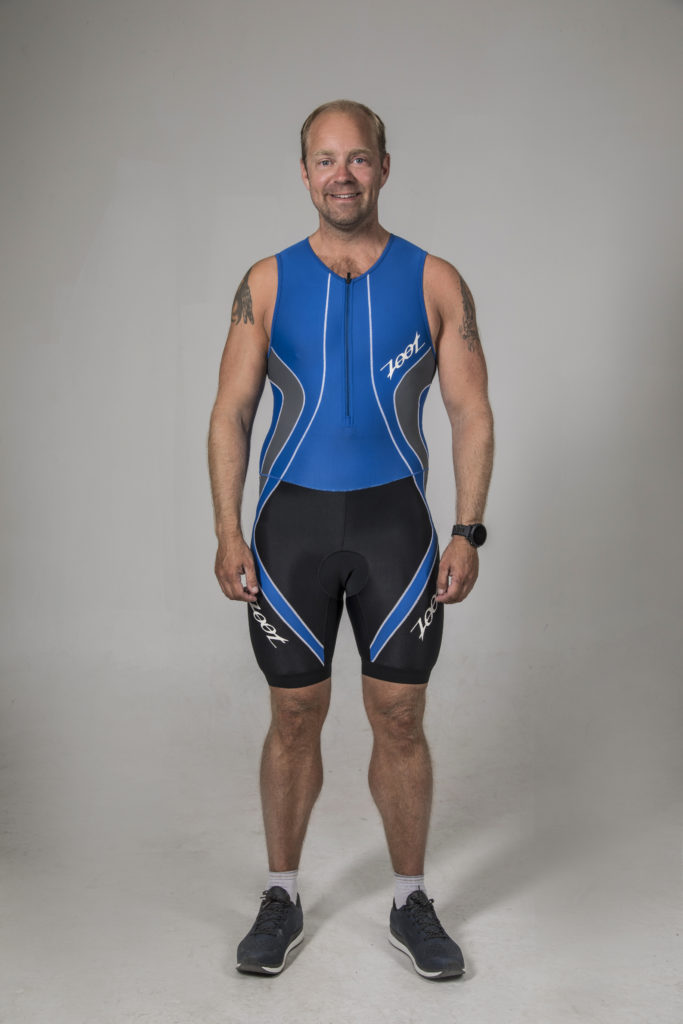
What do you want to say to other trans people who also want to do sports?
— Fight. And accept that you are transsexual, because I didn’t for a long time. Don’t create obstacles! Don’t think, just do, he says emphatically.
This thing, to do it even though it doesn’t always feel good, is the key that’s helped Lukas to conquer most obstacles.
But what could have made it easier for you, so that you didn’t have to struggle so much?
— A mentor that took care of me when I joined the club, even though I was a grown-up when I started. It’s easy for people to compare themselves to each other and thereby strengthen hierarchies when the group is reconfigured and new people come in. If there’s then a person who welcomes and talks to you instead of you having to stand there by yourself, there’s a greater chance that you’ll stay and become part of the group.
“I feel my best when it doesn’t matter to people that I’m transsexual. “
It’s important to signal that LGBTQ people are welcome, for example by having a rainbow flag in the premises or by the trainers using the word “ze”.
— It shouldn’t matter if you’re trans, homo or queer. Everybody should be treated equally. I feel my best when it doesn’t matter to people that I’m transsexual. I want neither advantages nor disadvantages because of my background, says Lukas.
Noel, scores points by jumping high
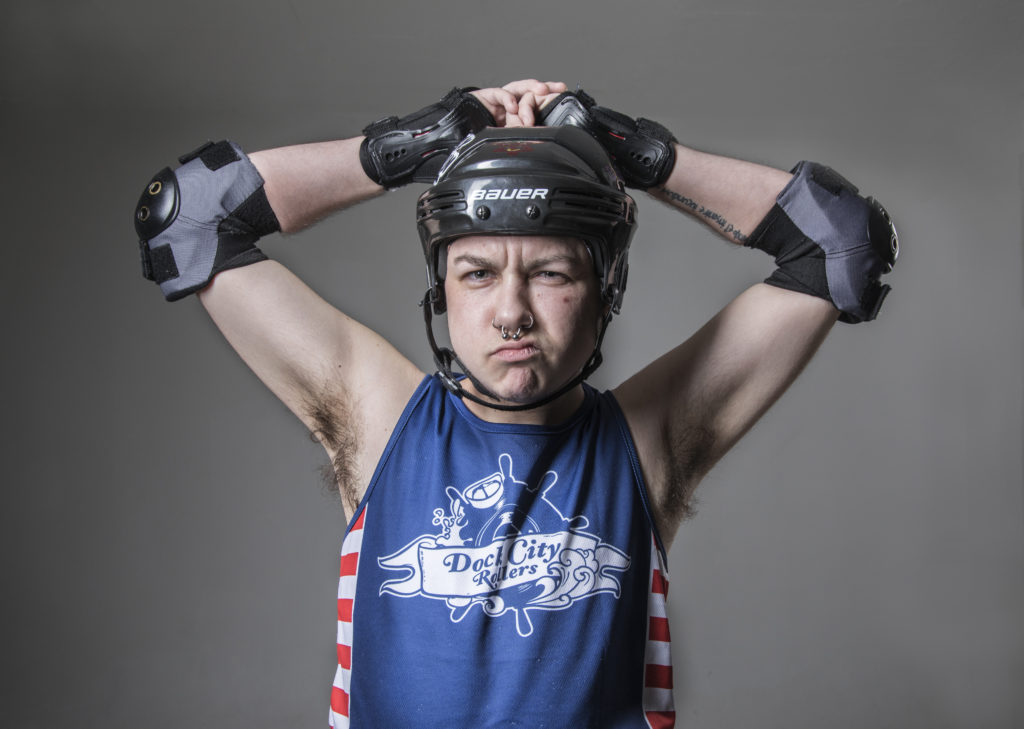
Name: Noel Andersson Köhler
Age: 28 years
Lives: Göteborg
Plays: Roller derby (earlier football, bowling and rugby )
Started doing sports: When I was six
Role model(s): Miracle Wips and Mallis Babs (roller derby player at a professional level)
For ten years football was the sport for Noel Andersson Köhler (28), but the division in women’s and men’s teams ultimately made him stop. After having come out as non-binary and trans masculine he discovered the rollerskating sport roller derby, which is famous for being female dominated and trans inclusive. After that he was hooked.
— I’m known as the monkey of the team since I score points on my high jumps, he says.
The first time Noel Andersson Köhler came in contact with roller derby was three years ago after having seen the film ”Whip it” (about a young girl who is alienated and finds her place in a roller derby club in Austin, Texas). He started wondering if the norm creative sport also existed in Sweden.
— My current partner plays roller derby, so she helped me try the first time, he says and laughs.
As a child he played a lot of football, but in his late teens he chose to quit because he didn’t like how the teams were divided by gender.
— There was a lot of focus on that you only could be on a team that had a specific gender. I didn’t feel comfortable with that, and neither with the thought of coming out as a boy.
Today Noel identifies as non-binary. He knows that he’s not a woman and at the same time he doesn’t feel comfortable trying to fit the male norm. The pronoun is still “he”, but when it comes to gender identity he feels that the term “man” is slightly too narrow.
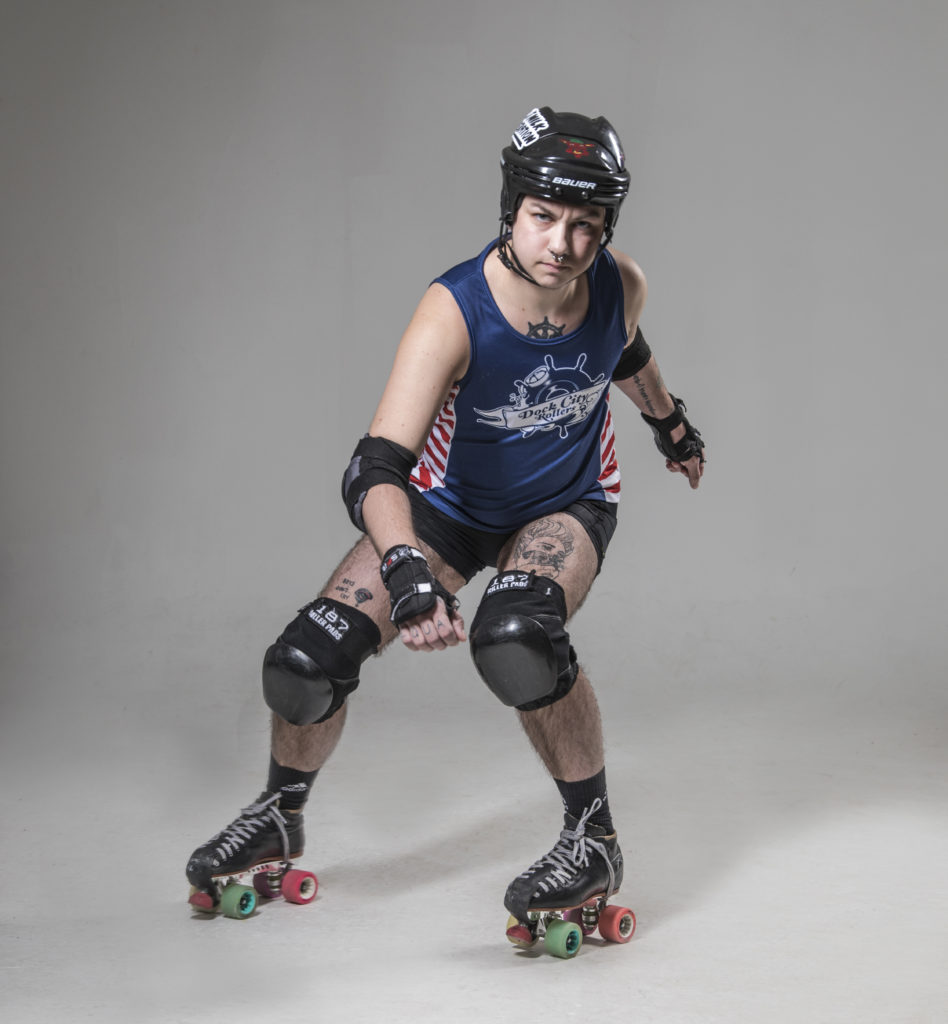
— In the beginning of the assessment (to access gender affirming treatment, editors note) I felt like I was really a “dude”. But later it was like “no, it doesn’t feel like that either”. I think it’s hard for me to identify with the male role. That image sucks, says Noel emphatically.
When the testosterone treatment started to give visible results, for about four years ago, he was looking for new sports to try out. He contacted clubs and visited gyms, but never felt he could completely relax. One incident in a locker room for men has stuck in his memory.
— Me and a friend were working out together and had a hard time changing because there was this dude who was very suspicious. I’m shorter than a regular guy and this was early in my treatment so I didn’t have facial hair yet. Either I looked like a very young boy or like someone who had entered the wrong locker room and was a full on lesbian, says Noel with a smile.
“To start playing was a way of doing something for myself”
But then you found roller derby…
— Yes, and it was really positive! It has meant so much. I could be open with my teammates about being a trans person. We always have pronoun rounds when new people join, and that felt very safe. Before I found the derby I was pretty depressed, so starting to play became a way of doing something for myself, to push myself in a way I hadn’t done in a long time.
Noel often comes back to that many people in roller derby are conscious and discuss both gender identity and identity overall. Some are between forty and fifty when they start playing, which contributes to a diversity of experiences and perspectives that enrich the discussion.
— Even if you have a bad day you want to go there, he says.
When it’s time for a game and he rolls onto the field dressed in a helmet, mouthguard and knee pads, he feels focused and the world around him slowly blurs.
“I feel all-powerful when I play”
— I feel all-powerful when I play, he says and starts laughing heartedly. Because this is something I’m really good at!
At the same time he says that there are moments when he’s nervous because he is perceived as a trans man playing on a women’s team. This feelings come when he meets players from other clubs.
— Even though the sport is very open I know know that the bigger community doesn’t share those values. People accept it, but some people might feel “what are you doing here”, because it’s still a women’s team.
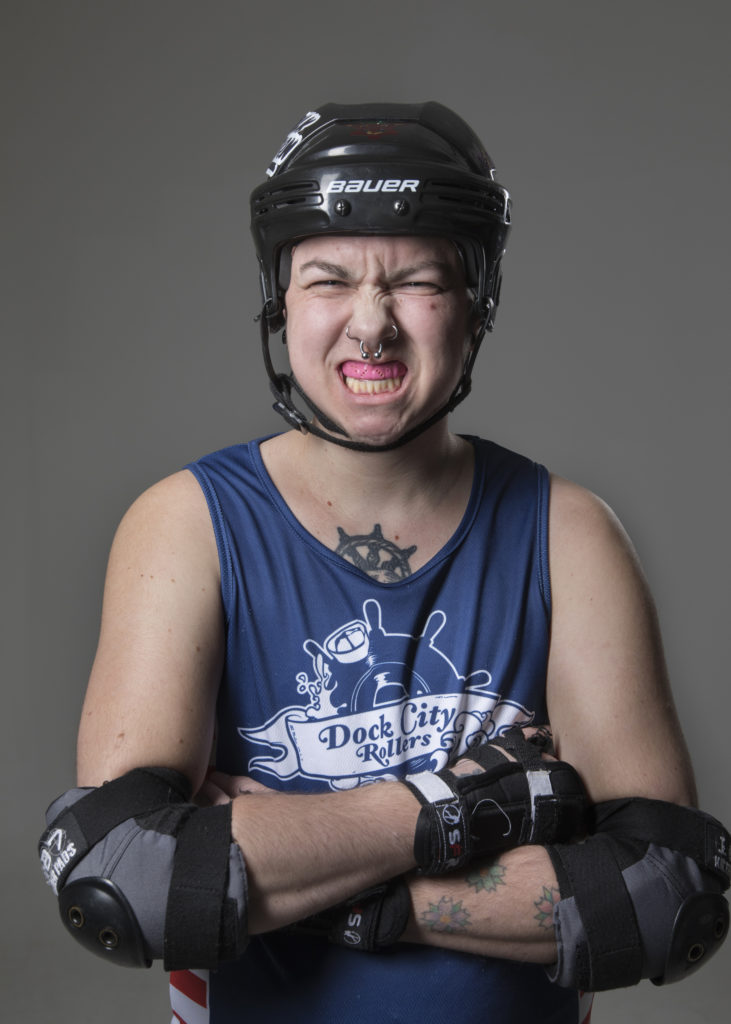
It was about a year ago that the main organisation Womens Flat Track Derby Association (WFTDA) produced a revised policy for gender and participation, where they clarified that the organisation strives to include all trans people, as long as they stand by WFTDA:s basic values. But the games are still played in teams divided by gender and it can be hard to understand who can or cannot play, according to Noel Andersson Köhler. He himself has a given spot as trans masculine and non-binary on his women’s team, he says, but it’s not to everyone’s liking.
— My club organised the Swedish championship not so long ago, and then some felt that it was a bit difficult to be in contact with a guy, since I was one of the coordinators. Most people are okay with it, but I think it’s because I’m perceived as a cis guy that some react. Before they get to know me.
Would they have felt the same way if they had talked to a trans woman?
— I don’t think so. It’s a bit funny, there are many more trans women that play on a high level in the open tournaments. But I only know of one trans guy. Some people might not be open about their trans identity, which is okay.
So there’s a lack of trans people born with a vagina?
— Yes, and I think that’s really remarkable…
Noels position in the team is called ”jammer”, whose main task is to get passed the opposition’s “cluster” that consists of four people. The most memorable moment thus far is from the first game that took place just about a year ago.
“I’m known as the monkey of the team”
— When I rolled onto the field I was given the leader position, the one who skates before the others in the group. In my scoring round I made an ”apex jump” and scored (one of roller derby’s spectacular moves that looks like a high jump in gallop, performed at a high speed and requires a lot of balance, editors note). This is something you practice for a long time, but for me it came naturally. So I’m known as the monkey of the team, since I can jump high and far.
Noels advice to other trans people who want to do sports is to try and stay within the sport you like, even if it’s tough.
— Most often there’s a person within each club that you can turn to. And if it doesn’t work, try and find a new club. I really believe, especially now, that there’s always a possibility. Dare to try new activities and bring a friend, that I think is good.
He also wants to appeal to the sports movement in general.
— A broader inclusion would have made it easier for trans people to do sports, that all sports weren’t gender divided, he concludes.
Vix, the gymnast who changes from within
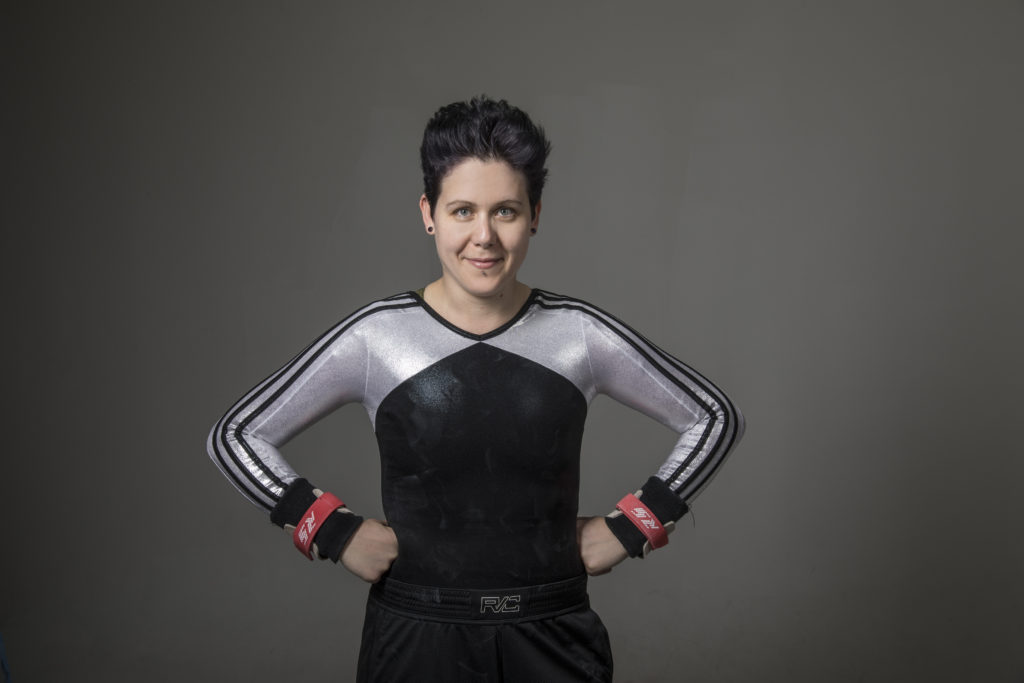
Name: Vix Herjeryd
Age: 34 years
Lives: Bromma
Practices: Artistic gymnastics (earlier also Kung Fu, air rifle shooting and cross-fit)
Started doing sports: When I was five
Role models: Oksana Chusovitina, who was the first to really challenge the age norm. She’s born in 1975 and still going strong at a professional level. And UCLA Gymnastics – university team that thinks outside the box when it comes to artistic expression and joy!
Artistic gymnastics is something amazing to Vix Herjeryd (34), who found a safe haven there as a child. But at the same time there are conflicted emotions about an “extremely binary” division of men and women, where the different genders “are two totally different disciplines”. Vix wants to influence the sport to make room for those who are beyond the two gender norm.
— For a long time I was acting, but I did it because I love the sport, ze says.
There’s no mistaking that artistic gymnastics is close to Vix Herjeryds heart. Ze describes it as a master that makes you challenge yourself and fight towards your goals. There are many different elements to learn and in that way you can find “your own thing”, says Vix.
— You can feel strong, gain a lot of self confidence and learn things that maybe not everybody can. It’s a very good place to escape to because you need to be present; if you think about other things you won’t be able to perform, ze says and smiles.
Vix emphasizes that the sense of community between the friends in the club is an important reason for gymnastics becoming an important part of life.
“You’re a good group that cheers each other on”
— You’re a good group that cheers each other on, where things around you don’t really matter that much. We help each other learn new things.
When ze was younger, Vix spent a lot of time at the gym to avert the thoughts about not feeling at home in ze’s body. Today ze identifies as non-binary; beyond the idea of belonging to one of two genders.
— I’ve felt better having muscles for example, and gymnastics has helped me with that. Sports has also been like an identity, which in a way is very peculiar since it’s been like an act for me. I had to put one identity to the side, in favor of another and that wasn’t easy.
Artistic gymnastics is “an extremely binary sport”, according to Vix, where the male and female variations are two different disciplines, with different apparatus for “women” and “men”. For a long time Vix felt forced to take on the role as “female athlete”. Just like in many similar sports appearance, in the form of style and personal expression, is judged.
— It has sometimes bothered me, because you’re fostered into a certain body language. Take girls for example, there’s a lot of glitter and pony tails. They are often extremely strong, powerful and goal orientated individuals, but this is hidden by things being sparkling and sweet. The boys can be proud and applaud their own performance while the girls are expected to gracefully walk away.
When ze was 19 years old Vix stopped competing because of mental ill-health. But ze has never completely left the sport, but has continued as a judge during competitions and has trained at lower levels and in more inclusive environments. A few years ago, when the term “non-binary” was established ze understood that it was what best could describe ze’s identity. Today Vix doesn’t want to put gymnastics to the side anymore.
— Now that I’m a bit older and it doesn’t matter I’ve wanted to be in the veteran championships and have a choreography that no one would expect. What happens then?
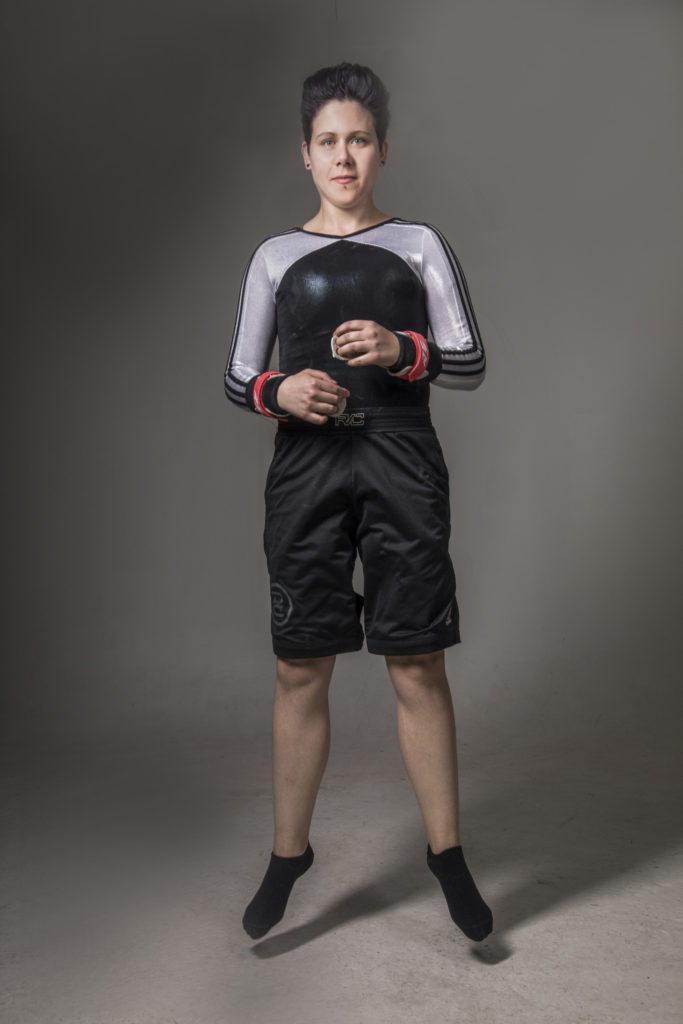
A more androgynous choreography?
— For example. Or that I sign up for half women’s disciplines, half men’s disciplines. Will they let me compete? I really want to try, because I think it’s important in order to make change happen.
But it can be hard to influence artistic gymnastics in a more gender neutral direction, says Vix, since it’s weighed down by traditions and is influenced by countries such as Romania, China and Russia, where the sport is big.
— I take small steps at a time and try to find different contexts where I can be myself and where I have the energy to influence. I have trained trainers and judges and tried to include pedagogy about viewing children as children, letting them find their own way of expressing themselves, even if it breaks the norms.
Vix has done the trainings for the Swedish Gymnastics Federation, where ze has been able to mix in ze’s own thoughts about a more gender neutral and inclusive sport.
— When the participants are trainers who train young children it’s easier, because when you get older, sports looks the way it does. There, it’s harder to influence. That’s why I’ve started my own gender neutral training for adults, where everybody gets to try everything.
Vix runs ze’s training under the roof of Hammarbygymnasterna in Stockholm, after having been running it at All Star Gymnastics for a while. Those who are interested gather and train what suits them, at the level and with the gender expression they prefer. The dream is to, in time, be able to start an organisation and a gym with focus on LGBTQ individuals. During Pride Week ze hopes to take a first step through a “trial session” in artistic gymnastics, and also parkour, in Pride Park.
What advice do you want to give trans people who want to try artistic gymnastics, but might not dare to?
— It of course depends on how old you are. If it’s about children I would recommend that parents cooperate and maybe become leaders, or start their own group. That they should contact an organisation to check if they can train the way they want to. Or turning to organisations like Transammans, for example, where trans people can try out different activities in a safe context. Adults can come and train with me, Vix laughs.
What three things could have made doing sports easier for you as a trans person?
— Role models and an awareness within sports that trans exists. Then I think there must be an opportunity to try and explore the sport you do. When I was a child I dreamt of doing rings, like the boys do. I also wanted to try bars. Today, as an adult, rings and bars are still two of my favourite disciplines. I think it would have been good if I had been able to try as a child. I want to contribute to making it possible for gymnasts today to get that opportunity.

